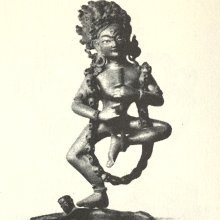Ih, Īh, Iḥ: 8 definitions
Introduction:
Ih means something in Hinduism, Sanskrit, Hindi. If you want to know the exact meaning, history, etymology or English translation of this term then check out the descriptions on this page. Add your comment or reference to a book if you want to contribute to this summary article.
Images (photo gallery)
Languages of India and abroad
Sanskrit dictionary
Source: DDSA: The practical Sanskrit-English dictionaryĪh (ईह्).—1 Ā. (īhate, īhāñcakre, aihiṣṭa, īhiṣyate, īhitum, īhita)
1) To wish, desire, long for; have in mind, think of with acc. or inf.; ईहन्ते (īhante) ... अर्थसंचयान् (arthasaṃcayān) Bhagavadgītā (Bombay) 16.12,7.22; Manusmṛti 4.15, 3.126; ऐहिष्ट तं कारयितुं कृतात्मा (aihiṣṭa taṃ kārayituṃ kṛtātmā) Bhaṭṭikāvya 1.11.
2) To endeavour to obtain.
3) To aim at or attempt, endeavour, strive; माधुर्यं मधुबिन्दुना रचयितुं क्षाराम्बुधेरीहते (mādhuryaṃ madhubindunā racayituṃ kṣārāmbudherīhate) Bhartṛhari 2.6; Y.2.116.
2) To take care of. -Caus. To impel, urge.
Source: Cologne Digital Sanskrit Dictionaries: Shabda-Sagara Sanskrit-English DictionaryĪh (ईह्).—[īha] r. 1st cl. (ṅa) īhaṅ (īhate) To endeavour, to aim or attempt. With sam prefixed, to wish, to desire.
Source: Cologne Digital Sanskrit Dictionaries: Benfey Sanskrit-English DictionaryĪh (ईह्).—i. 1, [Ātmanepada.] (sometimes [Parasmaipada.]) 1. To aim at, [Mānavadharmaśāstra] 4, 15. 2. To desire, [Bhartṛhari, (ed. Bohlen.)] 2, 6. 3. To desire to perform, [Mānavadharmaśāstra] 3, 205. Comp. ptcple. of the pres. an-īhamāna, Not desiring, [Yājñavalkya, (ed. Stenzler.)] 2, 116. Ptcple. of the pf. pass., īhita, Desired, [Prabodhacandrodaya, (ed. Brockhaus.)] 104, 5. n. 1. Exertion, [Mānavadharmaśāstra] 9, 208. 2. Desire, Mahābhārata 1, 1370.
Source: Cologne Digital Sanskrit Dictionaries: Cappeller Sanskrit-English DictionaryĪh (ईह्).—rihate (rihati), [participle] īhita (q.v.) be eager endeavour, strive after, wish for ([accusative]); have a mind or intend to ([infinitive]). sam = [Simple] — Cf. samīhita.
Source: Cologne Digital Sanskrit Dictionaries: Monier-Williams Sanskrit-English DictionaryĪh (ईह्):—[class] 1. [Ātmanepada] īhate, īhāṃ-cakre, īhiṣyate, īhitum, rarely [Parasmaipada] īhati, etc., to endeavour to obtain;
—to aim at, attempt;
—to long for, desire;
—to take care of;—to have in mind, think of (with [accusative]), [Mahābhārata; Rāmāyaṇa; Bhāgavata-purāṇa; Bhagavad-gītā; Pañcatantra etc.] :—[Causal] īhayati, to impel.
[Sanskrit to German]
Sanskrit, also spelled संस्कृतम् (saṃskṛtam), is an ancient language of India commonly seen as the grandmother of the Indo-European language family (even English!). Closely allied with Prakrit and Pali, Sanskrit is more exhaustive in both grammar and terms and has the most extensive collection of literature in the world, greatly surpassing its sister-languages Greek and Latin.
Hindi dictionary
Source: DDSA: A practical Hindi-English dictionaryIh in Hindi refers in English to:—(ind) here, in this world..—ih (इह) is alternatively transliterated as Iha.
...
See also (Relevant definitions)
Starts with (+111): Iha, Iha-laukika, Iha-lila, Ihaa, Ihabhava, Ihabhojana, Ihachitta, Ihacitta, Ihadvitiya, Ihagata, Ihage, Ihagihage, Ihahabe, Ihaim, Ihaim, Ihajanman, Ihajanmim, Ihaka, Ihakala, Ihakara.
Ends with (+227): Abhibrih, Abhidih, Abhimih, Abhivrih, Abrih, Adeh manih, Adih, Agastih, Agnih, Akar ampelas putih, Akur putih, Alih, Amih, Amulih, Anaadih, Anicaih, Anulih, Anusharih, Apanadrih, Apasalaih.
Full-text (+13): Iha, Prehana, Ihita, Ihati, Samihana, Iharthin, Samihita, Iha-lila, Ihamana, Ihatas, Samiha, Eha, Ihavrika, Anapi, Ihamriga, Vyatiha, Ish, Anehas, Samih, Ihalih.
Relevant text
One of your search terms exceeds the minimun character amount per search term. This amount currently equals 2.
No search results for Ih, Īh, Iḥ in any book or story.
Related products


